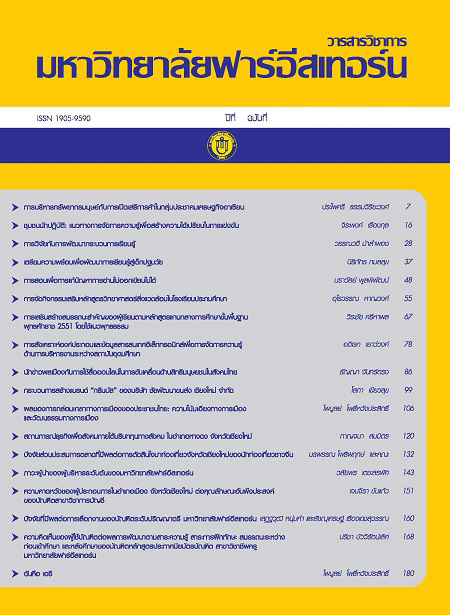การพัฒนารูปแบบการจัดกิจกรรมพัฒนาสมรรถนะวิชาชีพครู
Main Article Content
Abstract
โครงการวิจัยการพัฒนารูปแบบการจัดกิจกรรมพัฒนาสมรรถนะวิชาชีพครู มีวัตถุประสงค์เพื่อ (1) ศึกษาสภาพ ปัญหา และความต้องการของครูในด้านสมรรถนะวิชาชีพครู (2) พัฒนารูปแบบการจัดกิจกรรมพัฒนาสมรรถนะวิชาชีพครู และ (3) ศึกษาผลการใช้รูปแบบการจัดกิจกรรมพัฒนาสมรรถนะวิชาชีพครู มีครูเข้าร่วมโครงการวิจัย 159 คน จากโรงเรียน 3 แห่ง ได้แก่ โรงเรียนเรยีนาเชลีวิทยาลัย โรงเรียนบ้านทุ่งเสี้ยว (นวรัฐ) และโรงเรียนบ้านกอสะเลียม ผู้วิจัยดำเนินการ 4 ระยะ คือ ระยะแรก ประเมินสมรรถนะและจัดทำแผนพัฒนาตนเอง ระยะที่ 2 สร้างรูปแบบการจัดกิจกรรมพัฒนาสมรรถนะ ระยะที่ 3 นำรูปแบบการพัฒนาสมรรถนะวิชาชีพครูไปปฏิบัติตามแผน ระยะที่ 4 ติดตามและประเมินผลการพัฒนาสมรรถนะวิชาชีพครู ผลการวิจัยมีดังนี้ (1) ผลการศึกษาสภาพ ปัญหา และความต้องการของครูในด้านสมรรถนะวิชาชีพครู พบว่า ที่ผ่านมาผลการปฏิบัติงานของครูที่เกิดขึ้นจากการอบรมมีความคุ้มค่าน้อย คณะครูผู้บริหารจึงมีความสนใจ มีความเต็มใจเข้าร่วมโครงการพัฒนาสมรรถนะวิชาชีพครู มีความมุ่งมั่นและพันธสัญญาร่วมกันในการพัฒนาตนเองให้สอดคล้องกับหน้าที่ในโรงเรียน (2) ผลการพัฒนารูปแบบการจัดกิจกรรมพัฒนาสมรรถนะวิชาชีพครู พบว่า ครูมีรูปแบบการจัดกิจกรรมพัฒนาสมรรถนะวิชาชีพครู จำนวน 25 รูปแบบ แบ่งเป็นโรงเรียนบ้านกอสะเลียม 1 รูปแบบ โรงเรียนบ้านทุ่งเสี้ยว (นวรัฐ) 9 รูปแบบ และโรงเรียนเรยีนาเชลีวิทยาลัย 15 รูปแบบ โดยร้อยละ 37.11 จัดทำแผนพัฒนาสมรรถนะความสามารถในการวิจัยในชั้นเรียน มีแผนการพัฒนาตนเอง 5 รูปแบบ รองลงมาร้อยละ 31.45 จัดทำแผนพัฒนาสมรรถนะความสามารถในการใช้ภาษาอังกฤษเพื่อการใช้เทคโนโลยีต่าง ๆ มีแผนการพัฒนาตนเอง 4 รูปแบบ (3) ผลการใช้รูปแบบการจัดกิจกรรมพัฒนาสมรรถนะวิชาชีพครู พบว่า ครูส่วนใหญ่ได้พัฒนาสมรรถนะตนเองตามแผนที่กำหนดและมีสมรรถนะอยู่ในระดับดี ครูมีความพึงพอใจในการเข้าร่วมกิจกรรมพัฒนาสมรรถนะวิชาชีพครูในระดับมาก และปัญหาอุปสรรคจากการจัดกิจกรรมตามรูปแบบที่พัฒนาขึ้น คือความสามารถในการจัดการเวลาตามแผนการดำเนินงาน
The research entitled “Activity Arrangement Enhancing Teachers’ Professional Competency” has the following objectives which are (1) examining the condition, problems, and needs of the teachers concerning professional competency, (2) developing the model for arranging professional competency activities, and (3) studying the results of using the professional competency development model. The project was joined by 159 teachers from three schools, namely Regina Coeli College, Ban Thung Siaw (Nawarat), and Ban Kaw Salium. The research is conducted in four phases. Phase one is accomplished to assess the competency and prepare the self-development plan. Phase two is set to construct a model for the activity arrangement to enhance the competency. Phase three is settled to apply the model for developing the professional competency to implement according to the plan, and Phase four is done to monitor and evaluate the professional competency. The research findings are as what follows. First, the findings from examination over the condition, problems and the needs of the teachers concerning professional competency reveal that the teachers’ implementation as the consequence of the training is limited compared to the overall value of the training. The teachers and the administrators therefore are interested in participating in the project. They are determined and share common commitment to develop themselves so that the training is consistent with their responsibilities in school. Second, the findings on the development of the model for arranging professional competency activities reveal that the teachers have some 25 models for arrangement of the professional competency activities: one model from Ban Kaw Salium, nine models from Ban Thung Siaw (Nawarat), and 15 models from Regina Coeli College. Some 37.11 percent of the participating teachers prepare the plan for enhancing the competency in the classroom research and have some five models of the self-development plan. Some 31.45 percents of the teacher prepare the plan for developing the competency to use the English language in the technology and have some four models of self-development plan. Third, the result of application of the model for arranging professional competency activities reveals that the majority of the teachers develop themselves according the identified plan and they have competency in “Good” level. The teachers are satisfied with the participation in the activities to develop their professional competency activities in “High” level. The problems and obstacles from the activities arrangement based on the developed model are mostly related to the capabilities to arrange the schedule according to the implementation plan.
Article Details
1. Any views and comments in the Journal of Social Innovation and Lifelong Learning are the authors’ views. The editorial staff have not to agree with those views and it is not considered as the editorial’s responsibility.
2. The responsibility of content and draft check of each article belongs to each author. In case, there is any lawsuit about copyright infringement. It is considered as the authors’ sole responsibility.
3. The article copyright belonging to the authors and The Far Eastern University are copyrighted legally. Republication must be received direct permission from the authors and The Far Eastern University in written form.

